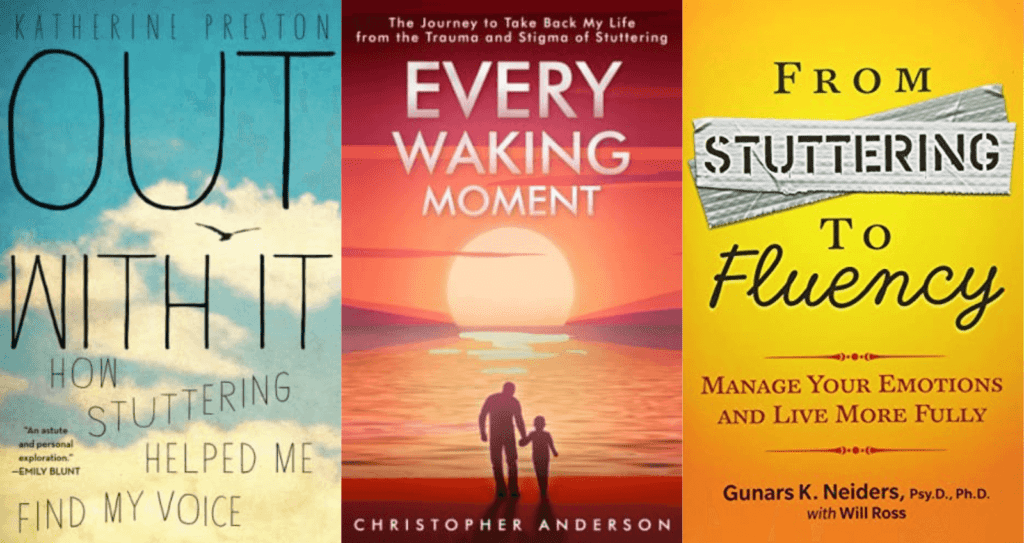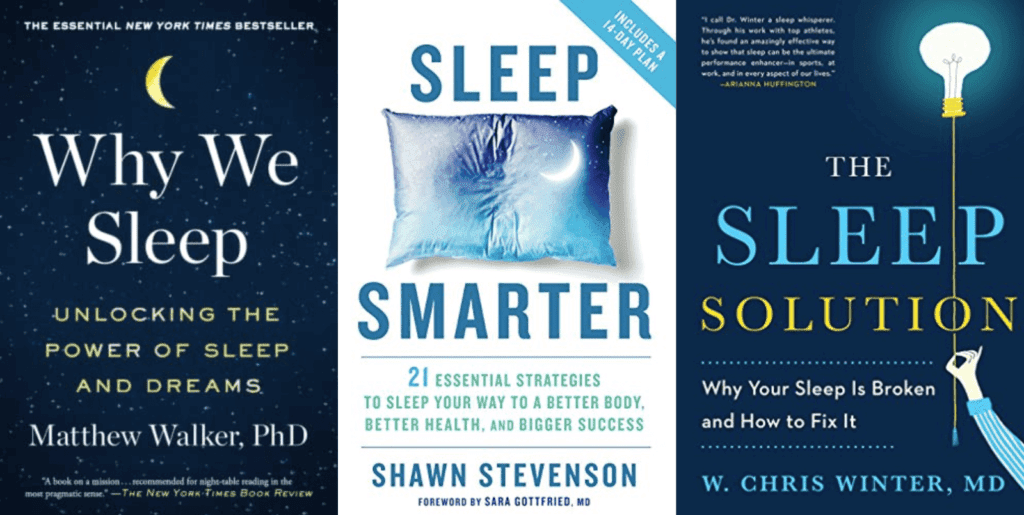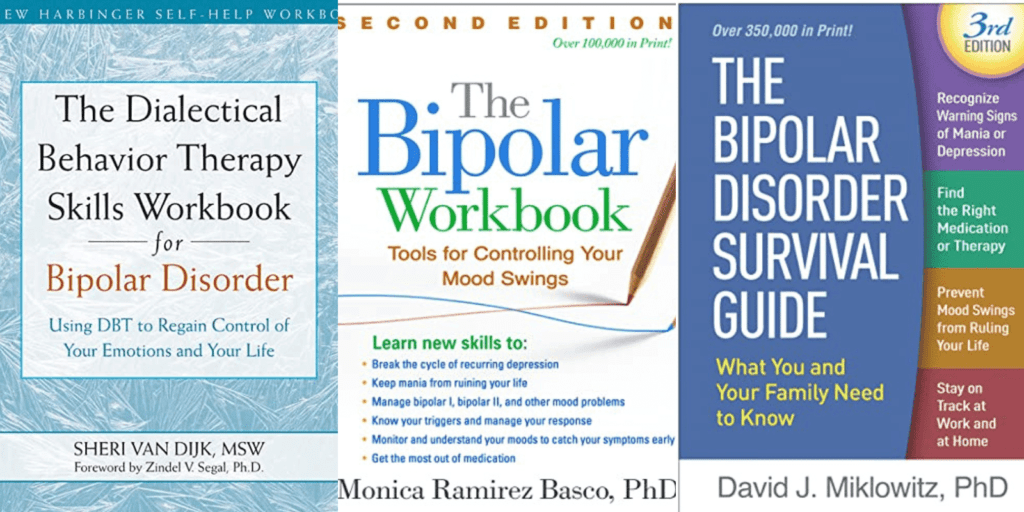The following are some of the best stuttering books.
Disclosure: Some of the links below are affiliate links. This means that, at zero cost to you, I will earn an affiliate commission if you click through the link and finalize a purchase.
What Is Stuttering?
Stuttering is a communication disorder characterized by disruptions in speech fluency.
People who stutter often experience involuntary repetitions of sounds, words, or phrases, as well as prolongations or blocks in their speech.
It can occur in both children and adults and may vary in severity from person to person.
Stuttering can also be accompanied by physical tension and anxiety.
It’s important to remember that stuttering does not reflect intelligence or ability, and with support and proper management, individuals who stutter can lead fulfilling lives.
Stuttering Books
1. Out With It
By Katherine Preston

Out With It is an anthology of expertise and experience that sheds light on an ancient problem that today affects 60 million people worldwide. It is a heartwarming memoir and a journalistic feat, a story about understanding yourself an learning to embrace the voice within.
Related: 30 Day Social Anxiety Challenge That Will Help You Feel More Confident
2. Stuttering & Anxiety Self-Cures
By Lee G Lovett

The author stuttered to age 30, then cured himself and, in the last six years, has given over 5,000 hours of free coaching to his readers and has posted 1,500 of his coaching videos online (with over 100,000 views) and has posted over 150 Success Stories of his students in his Speech Hall of Fame (viewable on the website of Speech Anxiety Anonymous). An entire stop-stuttering program has been built around this book and can be found at Speech Anxiety Cures’ website.
Related: Top 10 Practical CBT Exercises For Generalized Anxiety Disorder Relief
3. Beyond Stuttering
By Dave McGuire

Combining mental strategies with breathing techniques, this book explains The McGuire Programme, a proven technique for long-term improvement in speech and self-confidence for those who suffer from stuttering.
Developed through the author’s own struggles, readers learn to deal with their fear of stuttering by using a combination of physical techniques and mental strategies so that they can become better than normally fluent speakers.
Related: How Confident Am I Quiz (+Best 13 Practical Tools To Feel More Confident)
4. Every Waking Moment
By Christopher Anderson

Every Waking Moment is an intense, vulnerable, and insightful memoir showing how the struggle to communicate shapes the coming of age for those who stutter and what it means to accept yourstutter.
For millions of people worldwide, stuttering, also known as stammering, is defined by an endless uncertainty of how to escape its trauma and stigma. Thus, Christopher faces his greatest fears as he undergoes an extraordinary transformation that leads him life fulfillment:
- To find his one true love in marriage,
- To discover community in the National Stuttering Association,
- To an innovative speech-language pathologist who implores him to face his stutter, not hide it,
- To the frontlines of US national security in a dream job,
- To train for and finish brutal Ironman triathlons, and
- To what was once thought impossible, fatherhood.
5. From Stuttering to Fluency
By Gunars K. Neiders Psy.D., Will Ross

Unlike other books on the subject, From Stuttering to Fluency directly and systematically addresses the attitudes and emotions associated with stuttering. The emotional control techniques taught in this book show the person who stutters how to overcome fear and shame and live life to the fullest.
From Stuttering to Fluency shows how an attitude of self-acceptance, combined with speech manipulation techniques, reduces blocks and struggling speech, and increases speech fluency.
Related: Best 9 Stuttering Exercises For Adults to Stop Stammering (+FREE Resources)

6. Understanding and Controlling Stuttering
By CCC-SLP William D. Parry

Understanding and Controlling Stuttering: A Comprehensive New Approach Based on the Valsalva Hypothesis is a groundbreaking book written by CCC-SLP William D. Parry, an expert in the field of stuttering therapy.
With a gentle and patient tone, Parry takes readers on a journey through the Valsalva Hypothesis, which proposes that stuttering is caused by excessive tension in the vocal folds due to faulty breathing patterns.
Drawing from his extensive experience as a speech-language pathologist, the author provides a clear and accessible explanation of this theory, making it easy for readers to understand.
Parry encourages readers to take an active role in their own therapy, providing them with practical strategies and exercises to implement in their daily lives. By focusing on breathing techniques, relaxation methods, and vocal exercises, readers will gain the necessary tools to regain control over their speech.
7. Preschool Stuttering
By Mirla G. Raz

Preschool Stuttering: What Parents Can Do is a compassionate and insightful guide written by Mirla G. Raz, offering support and practical advice for parents navigating their child’s stuttering journey.
Drawing from her wealth of experience as a speech-language pathologist, she guides parents through the complexities of stuttering, providing reassurance and empowering them with effective strategies to help their child overcome this communication challenge.
Throughout the book, Raz emphasizes the importance of creating a nurturing and accepting environment for the child, highlighting the role that parents play in promoting self-esteem and resilience.
8. Stuttering
By Barry Guitar

Stuttering: An Integrated Approach to Its Nature and Treatment, authored by Barry Guitar, is a comprehensive and insightful book that delves into the complexities of stuttering.
With his expertise and extensive research in the field, Guitar offers a compassionate perspective on understanding and treating this communication disorder.
In this book, readers will find an integrated approach that combines various theoretical frameworks, allowing for a more holistic understanding of stuttering. Guitar explores the nature of stuttering, discussing its causes, symptoms, and impacts on individuals’ lives. However, what sets this book apart is its focus on treatment approaches.
Guitar emphasizes the importance of tailoring treatment to suit each individual’s unique circumstances and needs. He explores evidence-based practices, providing practical strategies and techniques that can be applied in therapy sessions or everyday situations. Through a combination of cognitive-behavioral therapy, speech therapy, and other therapeutic modalities, Guitar presents a well-rounded approach to managing and improving stuttering.
9. Beyond Stuttering
By Dave McGuire

Beyond Stuttering: The McGuire Programme – for getting good at the sport of speaking! is a groundbreaking book written by Dave McGuire, a renowned author and expert in overcoming stuttering.
McGuire understands the frustrations and insecurities that individuals who stutter face on a daily basis. With his extensive knowledge and personal experience, he introduces readers to the McGuire Programme, a comprehensive approach to tackling stuttering in a holistic and empowering manner.
In this book, McGuire emphasizes the importance of treating speaking as a sport, encouraging readers to view their journey towards fluent speech as an athletic endeavor. He shares proven techniques and strategies, which have been successfully used by thousands of individuals worldwide, to enhance speech control and communication skills.
10. Beyond the Fear of Stuttering
By Mary Wood

Beyond the Fear of Stuttering: My Journey to Self-Acceptance and Freedom, written by Mary Wood, is a compelling and inspiring paperback that takes readers on a personal journey towards overcoming one’s fear of stuttering and embracing self-acceptance.
The author’s story offers hope for individuals who have felt held back by their stutter, providing practical advice, coping strategies, and reassurance that change is possible. Through her own experiences, Mary Wood offers insights into the psychological and emotional aspects of stuttering, fostering understanding and empathy among readers.
Beyond the Fear of Stuttering goes beyond mere self-help tips and delves into the importance of self-acceptance and the power of embracing one’s unique voice. Mary Wood encourages readers to confront their fears, challenge societal stigmas, and redefine their relationship with stuttering.
How Stuttering Books Can Help
Stuttering books can be incredibly helpful in numerous ways. Here are a few ways in which these books can support individuals who stutter:
1. Education and understanding: Stuttering books provide valuable information about the causes, symptoms, and various aspects of stuttering. By delving into the subject matter, readers can gain a deeper understanding of their own stutter and how it affects them. Additionally, these books can also help family members, friends, and educators comprehend stuttering better, fostering empathy and support.
2. Coping strategies and techniques: Stuttering books often offer practical advice and effective techniques to manage stuttering. These resources may include breathing exercises, speech therapy techniques, mindfulness practices, and other strategies to help reduce anxiety and increase fluency. Readers can learn and apply these techniques at their own pace, empowering them to take control of their speech.
3. Encouragement and inspiration: Many stuttering books feature personal stories and experiences of people who have overcome challenges related to stuttering. These narratives can serve as a source of inspiration, reminding readers that they are not alone and that it is possible to lead fulfilling lives despite stuttering. This encouragement can boost confidence, self-esteem, and motivation to persist in their journey towards fluent speech.
4. Building self-acceptance: Stuttering books often emphasize the importance of embracing one’s unique voice and fostering self-acceptance. By reading about others’ experiences and learning to accept themselves as they are, individuals who stutter can gradually develop a positive self-image and shed any negative emotions associated with their speech.
5. Support networks and resources: Stuttering books often provide information on support groups, online communities, therapy options, and additional resources available for individuals who stutter. By exploring these networks and resources, readers can connect with others who share similar experiences, seek out professional assistance, and find further guidance and support.
Conclusion
Stuttering books play a vital role in helping individuals who stutter navigate their journey towards better speech and enhanced self-confidence.
They serve as a source of knowledge, inspiration, and practical tools for managing stuttering, ultimately making a positive impact on the lives of those affected by this speech disorder.



